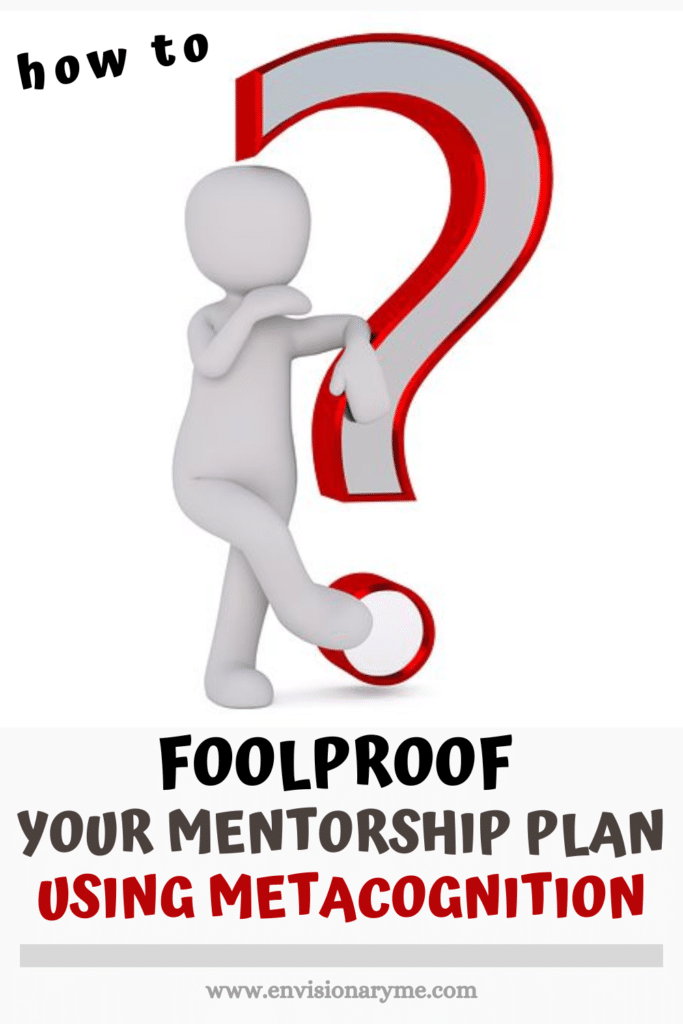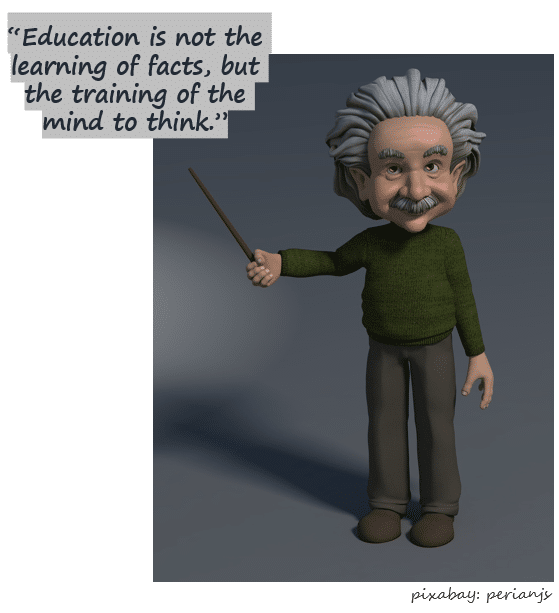Metacognition is like a secret weapon when it comes to structuring a mentorship plan. Mentors and mentees find their mentorship programs are most successful when the student’s needs, personal interests, and learning styles are all considered and worked into the plan. Using metacognitive strategies fosters stronger mentoring relationships, and self-reflection results in students becoming more invested and successful. It’s a learning strategy that works! Students can foolproof their mentorship plans using a metacognitive process.

Metacognition helps foolproof a mentorship plan by increasing commitment and effectiveness. Utilizing metacognitive skills while applying intrinsic and extrinsic motivational insights to the plan helps ensure follow through. Activities selected, and the timing and communication agreed upon, are based upon the mentor and mentee’s needs, wants, and real-life factors, which all play an important role in learning.
Why a metacognitive approach delivers results:
Ø Metacognition improves motivation.
Ø Metacognitive insights strengthen the getting-acquainted conversation.
Ø Incorporating metacognition leads to a value-added mentorship plan.
Ø Selecting personally motivating activities ensures follow through.
How metacognition improves motivation.
What exactly is metacognition?
Metacognition is the awareness of and understanding of your own thought processes. During a mentorship, those same personal insights lead to activity selections matching the mentee’s personal learning style, increasing the likelihood of follow-through. As a result of a mentee utilizing metacognitive insights, the mentorship process is more likely to reach a successful conclusion.
Metacognition improves a mentee’s motivation.
There are two types of motivation: extrinsic and intrinsic.
~ Extrinsic motivation: Extrinsic motivation is when you complete an activity to receive an award or avoid punishment. You are focused on the outcome and simply getting there. You do it because you are externally motivated.
~ Intrinsic motivation: Intrinsic motivation is when you engage in an activity because you find it personally interesting, enjoyable, and inherently satisfying. Your drive comes from within, to satisfy a personal need or desire. You take the action because you are internally motivated.
Understanding how you are motivated makes the difference.
Considering metacognition and extrinsic & intrinsic motivation when creating objectives and selecting supporting activities takes planning just a step further – and helps ensure follow through by both parties.
Self-efficacy (belief in your own ability to succeed) is absolutely maximized!
So will you be excited enough to use a bullhorn?! You should definitely celebrate!

Including content and activities that keep students engaged makes good sense. It’s a problem-solving tactic. Positive associations help learners stay connected to goals they would like to achieve, and they become more successful as a result. These mental processes work!
Using a metacognitive strategy is like having a student learning assistant. It helps students create direction by allowing them to combine knowledge and skills with personally motivating factors as part of the goal-setting process. It’s a form of self-regulation where following through and gaining results means more to you. The result is academic success.
How to use metacognitive insights while getting acquainted:
Getting acquainted is key to a mentorship program’s success.
Take 15-30 minutes & a cup of coffee. (or whatever you drink – just have the conversation.)
Get to know each other. The conversation is formal and informal – whatever is best for you.
~ Share who you are and why you are participating in this mentorship.
~ Share your personal journey and reflect upon your own learning goals.
~ Share your next steps and what may impact your success.
Understand why you are partnering – literally ask.
~ Why are you here today? What’s in it for you?
~ Chat about how you became partners.
~ Share schedules and decide how best to communicate.
Mentors and mentees are equally important in this relationship. Keep each other engaged and improve the process as you go. Knowing and understanding factors that influence your interest and motivation is metacognitive knowledge! It’s thinking about how you think! Put that knowledge to work for you.
Goal setting is more effective when you are aware of your partner’s needs. It allows you to monitor and evaluate each other as a team and your progress. It helps you maximize your problem-solving skills.
Your relationship may start off with a keen awareness of one’s own thoughts. However, as you become more aware of your partner as a fellow human, you metacognitively kick it up a notch!
In the most successful learning partnership, one’s learning and one’s thinking translate to team knowledge, so to speak. This deeper understanding promotes active learning on both sides, so you’ll both own the role as a teacher sometimes!
Increase the value of pre-planning through mutual commitment.
Before you dig in and craft your plan, make a verbal commitment.
· Agree on your commitment to the program and the plan you craft together.
Commitment should not be assumed, because life gets in the way.
· Agree to create a mentorship program based upon SMART goals.
Literally, agree that you are setting SMART goals. Obtain the buy in from both parties. If only one of you agrees to “time-bound” – who is most likely NOT to follow though?
At this point, you have asked all the right questions. You understand each other’s “why,” you know who’s got time and when, each other’s basic skills, and know both desire a great outcome.
WHAT NOW?

Create a value-added mentorship plan.
Ø Discuss and agree upon the mentorship objective.
Ø Create SMART goals that build to the achievement of the program.
Ø Brainstorm around activities that will help the mentee reach those goals.
Discussed, saved in your phone, or written on paper does not equate to following through.
Make sure you agree upon value of this program to head off any breakdowns in motivation.
What do I mean by value?
For example:
Ask 3 mentees: What is the value of the mentorship program?
Answer #1: I value this program because it’s a school requirement, but I’d rather sleep in on Saturday before studying for finals.
Answer #2: I value this program because I am graduating and need a job.
Answer #3: I value this program because it’ll help me start my business, so I will fit the meetings and activities around my class schedule and the job that helps me pay for school.
Obviously very different examples of value. Plan accordingly.
The mentee and mentor should continue using their metacognitive strategy!
Select motivating activities
You’ve discussed personal goals. You’ve discussed specific learning styles, processes and strategies, what it means to learn, and what goals will play a central role in your mentorship plan.
Plan to use your problem-solving skills and do not sweep any important details under a rug!

How to select an activity & why these cognitive processes are important!
Example from a mentor’s point of view:
My mentee suggests we attend a large-scale, outdoor fundraiser she supports.
Sounds like a terrific opportunity to connect and develop communication skills, talk with new people, and understand fundraising and small business sales tactics; several great objectives can be achieved by attending this event. The event is outside on a certain Fall Sunday.
However: I run my own business, and it’ll be my only day off. I live a solid hour away, adding two more hours to the commitment. It’s outside, I’m asthmatic, thousands will gather, parking is far, and includes walks of over a mile to the site – in the rain and cold. I don’t want to be negative, but that’s physically difficult for me and I just don’t have an entire day.
Solution: Be honest, upfront, and offer alternatives.
- Offer to meet beforehand to plan out the day and roleplay.
- Suggest your mentee go alone with a follow-up FaceTime or Zoom chat with you after.
- Select another activity to do together that meets both of your needs.

Example from a mentee’s point of view:
My mentor is an avid reader and suggests reading the autobiography of a famous leader.
He knows I am a visual learner and thinks this will help. I hate reading though. Always have. I outline like 8 chapters a week already, and 100% prefer videos, podcasts, and anything quick and on the go. He really wants me to read this -or listen to the entire thing on audio.
However: I have zero interest in this book. It’s far too long, but I said I would be open and try something new. I tried the audio version but must pay close attention; it goes on for hours. I hate this and need to find some summaries to act like I read it or listened.
Solution: Agree on the leadership topic – perhaps the person who wrote the autobiography. Maybe your mentor reads the book and shares a learning, and you share after taking on a podcast or series of infographics and videos. You can compare taking a traditional path to finding online sources sharing the same information.
No one is wrong. No one is right.
It’s simply an appreciation of different learning styles.
Ever heard the story of the girl who took piano lessons? Her parents bought her a piano and signed her up for lessons. All she wanted was to learn how to play songs she liked from a certain Broadway show, but the teacher wouldn’t allow it.
The teacher insisted on classical basics, which were understood at first, but only classical songs were assigned by the teacher thereafter. Nothing else was permitted. After six dreadful years of weekly chastising, hating practice, and learning little, the girl quit. Her Broadway songbook sat in the unused bench.
Thirty years later, she was sick of dusting the piano and gave it away to a friend who had always wanted to play, and who also happened to love that Broadway show. The friend, learning as an adult, also started with basics such as scales and some classical melodies, but her teacher took certain segments from those Broadway pages for her to practice too. He also made songs from that Broadway book part of her song plan, along with basic hand placement and scales. It was a nice, motivating blend.
The friend is having a much different experience.
Same thing here.
There are teaching strategies that work for most, and then there are ways to learn new content that actually works for You.
Mentorships can be easily foolproofed or even right-tracked by considering how others prefer to think and learn. Then consider what keeps them engaged, then align activities with schedules and personal interests. Matching a list of activities with intrinsically motivating factors is a win for you both. A metacognitive process transforms a learning process into a wonderful learning experience! Mentorships with the best possible outcome offer new insight and professional development for both the mentee and the mentor. You got this!

0 Comments